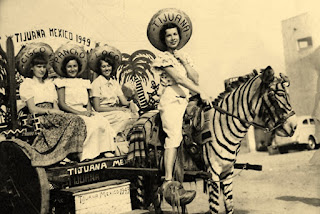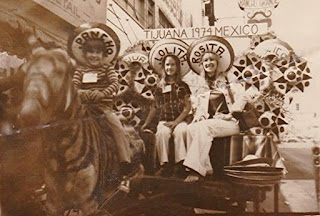[ad_1]
A classic hand-coloured(?) image postcard depicting a Tijuana ‘zebra’,
from my assortment (Picture of this image postcard © Dr Karl Shuker)
In 2004, after I visited the
metropolis of Tijuana in Baja California, Mexico, simply throughout the border from San
Diego in California, USA, I noticed one of many well-known ‘Tijuana zebras’ (aka
zonkeys, however to not be confused with true zonkeys, that are zebra x donkey
hybrids – click on right here for a ShukerNature survey of zonkeys, zorses, and zeedonks). Evidently, these eyecatching equids should not actual zebras, however
as an alternative are donkeys humanely painted with stripes utilizing girls’s hair dye to
make them appear to be zebras for photo-opportunities widespread with vacationers –
besides with me, that’s.
Bizarrely, I failed not solely to
take a single {photograph} of the one ‘zebra’ that I noticed, but additionally to grab the chance
of shopping for an official posed photograph of me with it (my solely excuse for such remiss
behaviour being that again then, I did not realise simply how iconic and distinctive an
facet of Tijuana these animals are), and even at present, over 16 years later, I
nonetheless remorse not doing so. Happily, I’ve a minimum of been in a position to buy on-line
some wonderful classic image postcards depicting varied Tijuana ‘zebras’
from bygone a long time, so these should suffice. One instance from my
assortment opens this current ShukerNature weblog article, and this is one other
one:
Additionally from my assortment, a second classic hand-coloured(?) image
postcard depicting a Tijuana ‘zebra’ (Picture of this image postcard (Picture of
this image postcard © Dr Karl Shuker)
However when (and, above all, why!) did this decidedly
unusual custom of portray stripes on donkeys in Tijuana start? (Certainly, it
is a practice so intimately related to this metropolis that even its skilled
basketball workforce is called after these curious creatures – the Tijuana Zonkeys.)
Recollections
might range (as a sure majestic woman apparently as soon as stated about a completely
totally different matter…), however the majority of sources that I’ve learn on the topic agree
that it arose throughout or instantly previous to the World Conflict 2 interval of the
Forties. Ever since playing in Mexico had been declared unlawful, in 1935, the
ensuing closure of Tijuana’s on line casino, hitherto an amazing vacationer draw, had
created an amazing void that someway wanted to be stuffed if vacationers had been to proceed
visiting town, however how?
Remembering {that a} pair of donkeys with carts that used to
stand exterior the on line casino had at all times been a favorite, frequently-photographed
attraction, a number of the metropolis centre’s enterprising youths come across the money-spinning
thought of bringing in donkeys with richly ornamented carts that vacationers may very well be
photographed with, however this time for a price.
Positive sufficient, they proved highly regarded and
additionally very profitable, changing into a standard sight alongside Avenida Revolucíon
(Revolution Avenue), extensively frequented by partying vacationers, however there was
one main drawback. Again within the Forties, commonplace on a regular basis images was virtually
completely of the black-and-white selection, which meant that Tijuana’s predominantly
unicoloured, monochromatic donkeys hardly confirmed up within the
ensuing pictures. If solely there was a strategy to give these animals extra visible
distinction.
Two early b/w photographs (the second sepia-tinted) of Tijuana ‘zebras’ from 1944 (public area)
There’s a lot controversy regarding who
originated the novel thought of portray black stripes on Tijuana’s tourist-magnet
donkeys to attain the required stage of distinction for photographic functions,
however, no matter his identification, by the tip of the Forties Avenida Revolucíon was
residence to a lot of these home-made zebras, and a brand new Tijuana custom was
duly born. Furthermore, to optimize the extent of distinction exhibited by them, the
donkeys often (although not at all times) have a white powder utilized to their coats earlier than the black
stripes are painted on, as was the case with the person who I noticed (click on right here to view a brief video on YouTube of a typical Tijuana ‘zebra’).
By the late Seventies, no fewer than 25
‘zebras’ with their homeowners may very well be encountered in Avenida Revolucíon, every
with their very own particular allotted spot for attracting vacationer commerce. But by the
time of my go to in 2004, this quantity had decreased considerably, due in no
small strategy to the precipitous fall within the variety of vacationers visiting from
throughout the border within the USA for the reason that dreadful occasions of 9/11. A decade later,
furthermore, in accordance with a 2013 report issued by Washington D.C.’s Nationwide
Public Radio, solely three Avenida Revolucíon ‘zebras’ remained.
Apparently,
this specific Tijuana ‘zebra’ was photographed in Might 2004, i.e. simply weeks
earlier than I visited Tijuana – so in view of how few specimens had been nonetheless current
by then, it may nicely be the exact same animal that I noticed there (public area)
In an try and elicit elevated
curiosity and metropolis satisfaction in its fake zebras, a 12 months later, in 2014, they had been
formally declared a part of Tijuana’s cultural heritage by the Cultural Heritage Council
of the State of Baja California in northern Mexico. Nonetheless, its determination was
revoked in 2017, following protests from animal-rights activists, with the
unnamed federal choose chargeable for this authorized reversal ruling that as a result of residing
entities should not actual property, they can’t be thought of a part of Tijuana’s
cultural heritage. That call doesn’t stop these few ‘zebras’ nonetheless
current from persevering with to ply their commerce, by way of their homeowners, on Avenida
Revolucíon, though the activists have said that they would like
life-sized fibre-glass replicas for use, quite than the residing animals
themselves.
At current, the survival of Tijuana’s
longstanding custom of its tourist-touting pseudo-zebras stays unsure.
I’ve by no means learn or heard about any claims of their homeowners mistreating them, so
so long as they’re certainly nicely cared for and never burdened by publicity to
vacationers, it appears a disgrace if these celebrated equine ambassadors for Tijuana had been
to vanish from Avenida Revolucíon the place they’ve introduced such color and
distinctive enchantment for therefore lengthy.
(High) A sepia-tinted
b/w photograph of a Tijuana ‘zebra’ snapped in 1949 (public area); (Backside) One thing totally different, a Tijuana ‘panda’! – a Tijuana donkey painted to appear to be a large panda as an alternative of a zebra, snapped in 1960 (© proprietor unknown to me regardless of in depth on-line searches – reproduced right here on a strictly non-commercial Honest Use foundation for academic/overview functions solely)
Lastly: though the Tijuana ‘zebras’
should not cryptids, I can completely reveal right here on ShukerNature a direct hyperlink
between them and cryptozoology, courtesy of the pleasant {photograph} offered
beneath, which was snapped in 1974. Depicted together with his household throughout a
vacation in Tijuana, sporting the sombrero labeled Pancho, and aptly garbed in a
striped sweater, the little boy sitting upon a Tijuana ‘zebra’ grew as much as
turn out to be certainly one of at present’s most well-known cryptozoologists. Any guesses as to his
identification?
In actual fact, it is none aside from my
longstanding buddy from Texas, Ken Gerhard, who very kindly emailed me this household
photograph for my article after I talked about to him fairly some time in the past now that I used to be
planning to weblog in regards to the Tijuana ‘zebras’ on ShukerNature. Thanks Ken! And
now, finally, I’ve completed so.
Ken
Gerhard, sitting upon a Tijuana ‘zebra’ as a teenager together with his household in 1974 throughout a
vacation in Tijuana (© Ken Gerhard)
[ad_2]









